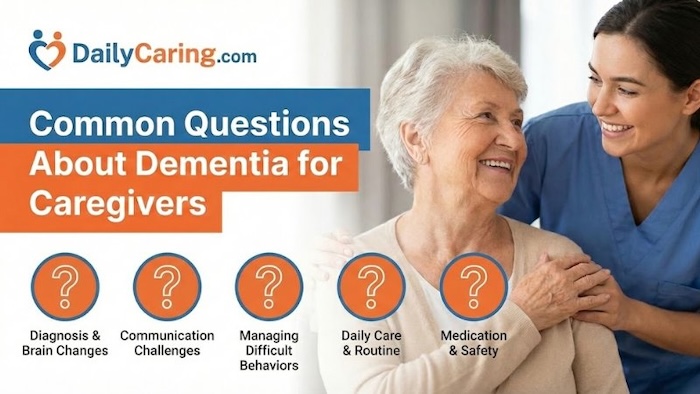When an aging loved one starts to forget names, misplace keys, or seem confused, it's natural to worry and wonder: Is it Alzheimer's or dementia? These terms are often used interchangeably, leading to widespread confusion at a time when clarity matters most.
While deeply connected, understanding the crucial difference between them is the essential first step in navigating diagnosis, care, and future planning. Let's demystify these terms and provide you with the knowledge you need to advocate effectively for your family's health.

Alzheimer’s and Dementia Aren’t the Same Thing
Many people use the words Alzheimer’s and dementia interchangeably, but it’s essential to know that they’re not the same thing.
Dementia is a syndrome, a group of symptoms related to a specific disorder or disease. It’s not a disease in itself.
Dementia is caused when the brain is damaged by diseases like Alzheimer's, mini strokes, or traumatic brain injury.
Alzheimer's disease is a form of dementia. It’s the most common type and accounts for 60 – 80% of all dementia cases.
However, not all dementia is caused by Alzheimer's. Aside from Alzheimer’s, there are 8 major types of dementia.
Learning about the difference between Alzheimer’s and other dementias is essential because it helps you make more informed care decisions and find effective ways to manage symptoms.
We explain what dementia is, what Alzheimer’s disease is, and the differences between symptoms for Alzheimer’s vs. dementia.
What is Dementia?
Dementia is an overall term for a wide range of symptoms associated with a decline in memory, reasoning, and cognitive skills.
It’s important to know that dementia isn’t a regular part of aging.
It’s caused by physical changes in the brain that are usually triggered by disease, stroke, or injury.
Typical Symptoms
Dementia isn’t just about simple memory lapses like forgetting someone’s name, where you parked, or where you left your glasses.
A person with dementia struggles with at least two of the following:
- Memory
- Communication and speech
- Focus and concentration
- Reasoning and judgment
- Visual perception (can’t see the difference in colors or detect movement, or sees things that aren’t there)
There are many different types of dementia, so the specific symptoms that someone could experience will depend on the parts of their brain that are damaged and the disease that’s causing the dementia.
The Different Types of Dementia
Alzheimer's disease is the leading type of dementia and accounts for 60 – 80% of all dementia cases.
The second most common is vascular dementia, which is typically caused by stroke or transient ischemic attacks (TIAs or mini-stroke).
Other conditions can also cause symptoms of dementia.
Some are reversible, like urinary tract infections (UTIs), delirium, thyroid problems, or vitamin deficiencies. Others, like Parkinson’s disease, are not reversible.
What is Alzheimer’s Disease?
Alzheimer's disease is a progressive brain disease. It’s the 6th leading cause of death in the United States and, as of now, there is no cure.
Alzheimer’s causes problems with cognitive functions like memory, judgement, decision-making, and behavior.
Typical Symptoms
Alzheimer’s symptoms are unpredictable, but usually develop slowly and worsen over time.
It will get progressively more difficult for the person with Alzheimer’s to carry on a conversation or perform everyday tasks.
Other common symptoms are confusion, aggression, and mood changes.
In the early stages, memory loss and other symptoms are usually mild.
In later stages, common symptoms include problems with communication, complete dependence on others for care, loss of mobility, incontinence, problems eating, and challenging behaviors like repetitive questions, rummaging, wandering, or asking to go “home.”
Current FDA-approved treatments may reduce or delay symptoms, but typically work best in the early stages of the disease.
Alzheimer’s vs. Dementia Symptoms
Because Alzheimer’s and other dementias cause cognitive impairment, symptoms for the various types of dementia often overlap.
Generally, Alzheimer’s and other dementias cause:
- Impaired memory
- A decline in the ability to think and use reason and judgment
- Impaired speaking and communication ability
Alzheimer’s symptoms typically include:
- Loss of short-term memory
- Impaired judgment
- Disorientation
- Confusion
- Behavioral changes
- Difficulty speaking, swallowing, or walking in advanced stages of the disease
Lewy body dementia (LBD) has many symptoms in common with Alzheimer’s.
However, in LBD, people are more likely to experience visual hallucinations, difficulties with balance, and disturbed sleep.
In dementia caused by Parkinson’s disease, people are more likely to experience tremors, slowed movements, rigid muscles and joints, and speech changes.
Final Thoughts on Alzheimer's vs Dementia
Armed with this knowledge, you are no longer facing a vague, frightening concept, but a defined path forward. Knowing the difference between dementia and Alzheimer’s empowers you to ask the right questions during medical appointments, seek out the most relevant support resources, and make informed care decisions.
This understanding is more than just terminology—it’s a tool for compassion, reducing fear through clarity, and building a foundation for the most appropriate and supportive care for your loved one's specific journey.
Recommended for you:
- What Is Alzheimer’s Disease? Symptoms, Causes, Treatments
- 8 Forms of Dementia You Might Not Know About
- What Is Vascular Dementia? Everything You Need to Know
About the Author

Connie is the founder of DailyCaring.com and was a hands-on caregiver for her grandmother for 20 years. (Grandma made it to 101 years old!) She knows how challenging, overwhelming, and all-consuming caring for an older adult can be. She also understands the importance of support, especially in the form of practical solutions, valuable resources, and self-care tips.














Need more answers my mate has the start of something since last year and tells me to move and find another man no love fights with me and no love making 5 years he also abusive me help and makes bad choices not much money!!!!
If you’re being abused or feel like you’re in danger, please leave the situation and/or get help right away. Your safety is number one! For advice, a great free resource the Alzheimer’s Association. Their phone number is 1-800-272-3900 and they are available 24 hours a day, 7 days a week. It also sounds like your partner may need medical treatment. Please try to get him to see a doctor for a complete physical and mental evaluation.
The simplest way to state this is: “All Alzheimer’s is dementia but not all dementias are Alzheimer’s.”
The only reason Alzheimer’s became a dominant term is because in the years from 1969-1972, a number of very big drug companies re-awoke the buried name “Alzheimer’s” in order to start the big campaign for the one-drug fits all dementias.
In 1969, we hadn’t heard from Dr Alzheimer since his death in 1915.
While it’s good for people to know dementia is a disease, as opposed to “crazy”, the dominance still of use of the word Alzheimer’s has probably been a major factor in the failure in 40 years to find one useful remedy for intervention.
Only now, and still not in the majority, is research beginning to explore in a less single-pointed way. To look for one thing to fix “dementia” is like treating smallpox, influenza and Zika as one “fever”.
No wonder it’s taking so long…………..